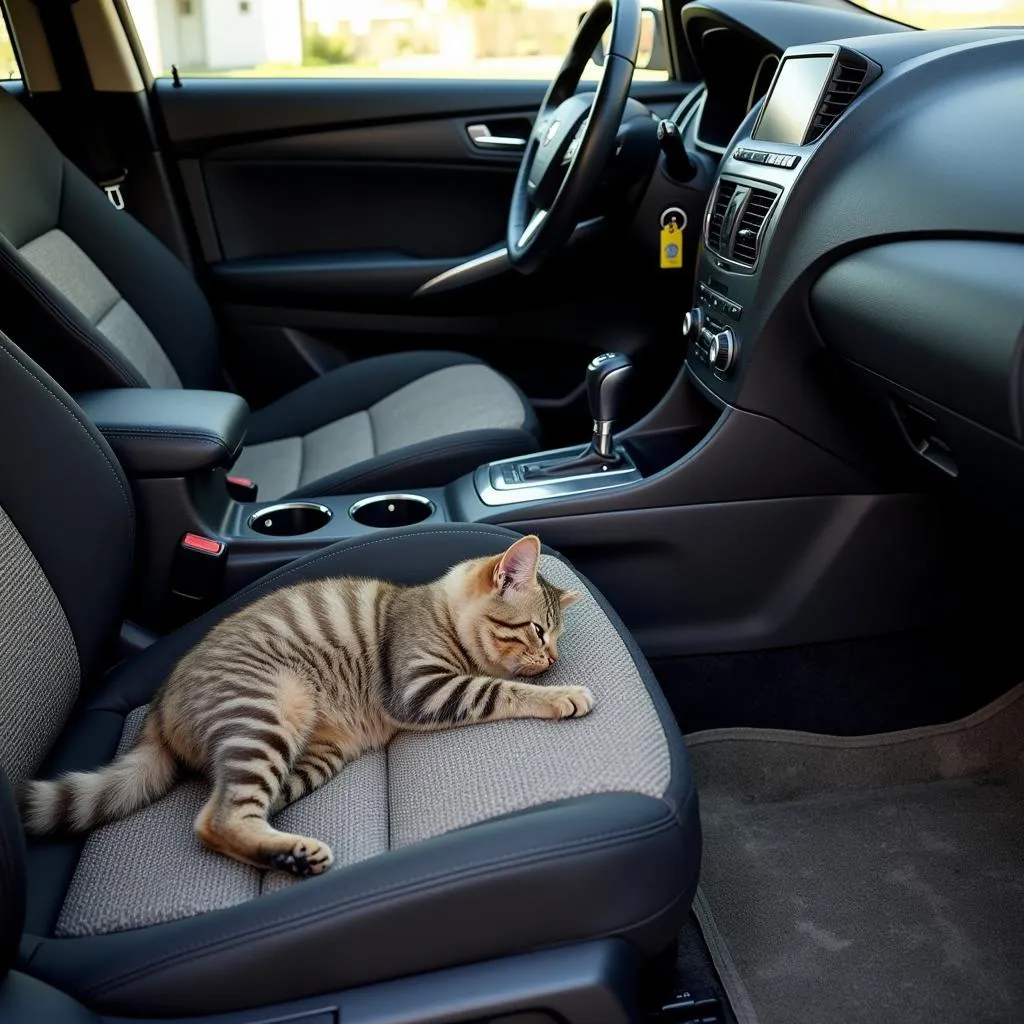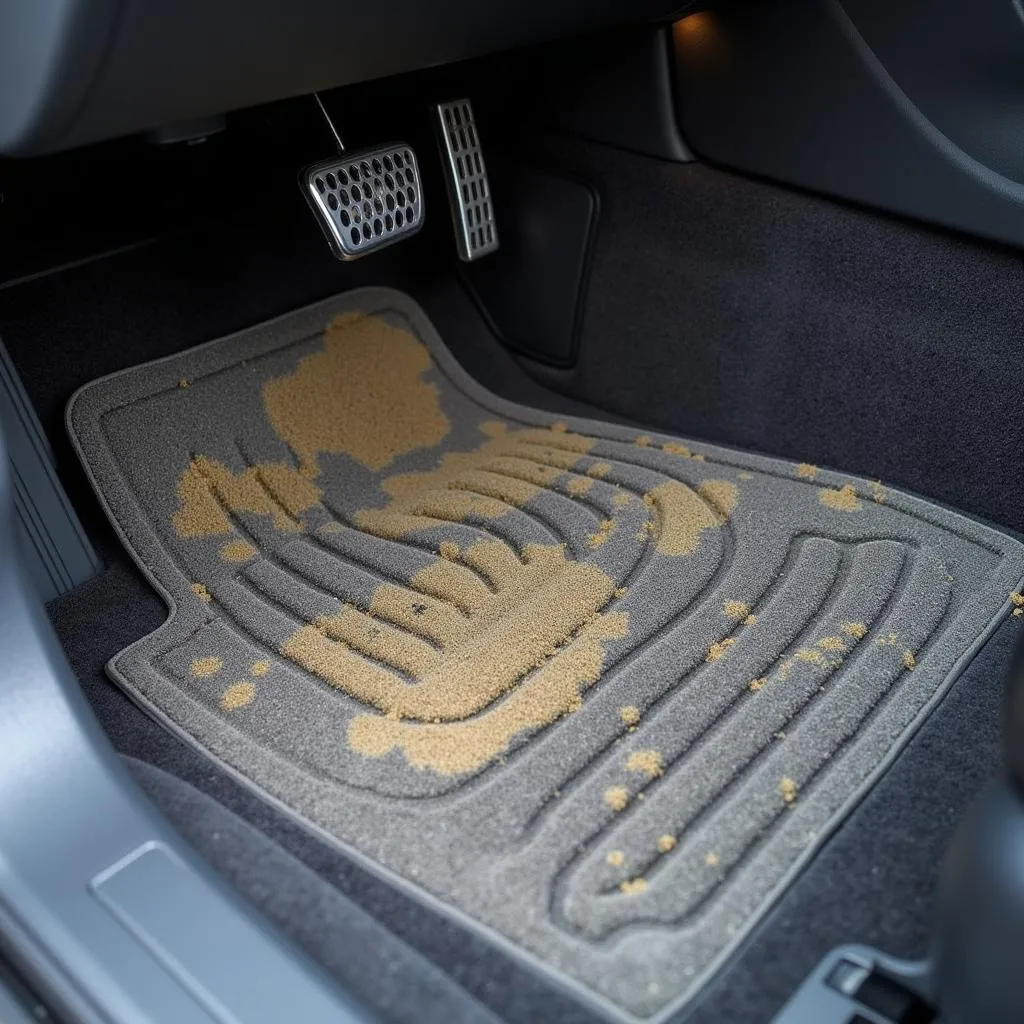If your car suddenly smells like cat pee but you don’t own a cat, don’t panic! This surprisingly common problem can be caused by various factors, and luckily, most are relatively easy to address.
 Car interior smelling like cat urine
Car interior smelling like cat urine
Common Culprits Behind the “Cat Pee” Smell
While a stray cat marking its territory might be the first thought, several other culprits could be causing that pungent odor in your car. Here are the most common reasons:
1. Spilled Liquids
One of the simplest explanations for a cat pee smell in your car is an actual spill. It might not even be urine! Forgotten drinks, especially acidic ones like juice or soda, can leave behind a lingering odor that resembles cat pee as it decomposes. Spilled milk, baby formula, or even some cleaning products can also create a similar stench.
2. Trapped Moisture and Mold
Cars are prone to moisture buildup, especially in humid climates or during rainy seasons. Wet floor mats, damp upholstery, or even a clogged AC drain can create the perfect environment for mold and mildew to thrive. Some types of mold emit an ammonia-like odor, which is a key component of cat urine, hence the similar smell.
 Mold growth under car floor mat
Mold growth under car floor mat
3. Electrical Problems
Believe it or not, electrical issues can sometimes produce a smell reminiscent of cat pee. Overheating wires, faulty wiring harnesses, or a malfunctioning heater core can release a distinct odor often described as “burnt plastic” or “electrical burning.” These smells, while not identical to cat pee, can be easily mistaken for it, especially in a confined space like a car’s interior.
4. Mechanical Fluid Leaks
Certain fluids essential for your car’s operation can also mimic the smell of cat urine when they leak. Antifreeze, known for its sweet, sickly odor, is a common culprit. Similarly, a leaking battery can produce a sulfuric smell that some people find similar to cat pee.
Troubleshooting the Source of the Smell
Identifying the source of the smell is crucial for effectively eliminating it. Here’s how to play detective in your car:
- Start with a thorough cleaning: Remove everything from your car, including floor mats, car seats, and any belongings. Vacuum meticulously, paying extra attention to crevices and under the seats. Shampoo the carpets and upholstery to neutralize any lingering odors.
- Inspect for spills: Examine your car’s interior for signs of past spills, especially around the floorboards, under the seats, and in the cargo area. Look for stains, discoloration, or sticky residues that might indicate a spill.
- Check for leaks: Look for signs of fluid leaks under the hood and beneath the car. Antifreeze is usually bright green or orange, while battery acid is clear and leaves a white, powdery residue.
- Inspect the AC drain: Locate the AC drain tube (usually located near the firewall on the passenger side) and check if it’s clogged. A clogged drain can cause water to back up into the car’s interior, leading to a musty smell and potential mold growth.
 Mechanic inspecting car for fluid leaks
Mechanic inspecting car for fluid leaks
Seeking Professional Help
If you’ve exhausted all DIY options and the smell persists, it’s time to call in the professionals. A qualified mechanic can:
- Accurately diagnose the source of the smell using specialized equipment
- Repair any mechanical issues, such as fluid leaks or electrical problems
- Recommend and apply professional-grade odor removal treatments
Expert Insight: “Sometimes, the source of the smell is hidden deep within the car’s ventilation system or requires specialized knowledge to identify,” says John Miller, Senior Automotive Technician at Miller’s Auto Repair. “In such cases, a professional inspection is crucial for a permanent solution.”
Preventing Future Odor Problems
Prevention is always better than cure. Keep your car smelling fresh by:
- Cleaning up spills immediately
- Regularly airing out your car
- Using moisture-absorbing products, especially in humid climates
- Scheduling routine car maintenance
By being proactive and addressing any issues promptly, you can ensure that your car remains a pleasant and odor-free space to enjoy your journeys.
Frequently Asked Questions
1. Can I use baking soda to get rid of the smell?
Baking soda is excellent for absorbing odors, but it might not be enough to eliminate strong smells like cat pee entirely. It can be a helpful step in the cleaning process, but it’s not a guaranteed solution on its own.
2. Will an air freshener mask the smell?
Air fresheners only mask odors temporarily. They don’t address the root cause of the problem and can sometimes mingle with the existing smell, creating an even less pleasant aroma.
3. How long does it take to eliminate the cat pee smell completely?
The time it takes to eliminate the smell depends on the severity of the problem and the chosen solution. Simple cleaning might suffice for minor odors, while professional treatments might be necessary for deeply embedded smells.
4. Can the cat pee smell be harmful to my health?
While the smell itself might be unpleasant, it’s unlikely to be harmful in most cases. However, if the smell is due to mold growth, it can pose health risks, especially for individuals with allergies or respiratory issues.
5. How often should I clean my car to prevent odors?
It’s recommended to clean your car’s interior every 2-4 weeks to prevent dirt, dust, and potential odor-causing substances from accumulating.
Need Help? We’re Just a Call Away!
Still, struggling with a persistent cat pee smell in your car? Don’t let the mystery linger! Our team of expert mechanics at Tech Car USA is ready to help. Contact us today for a thorough inspection and effective odor removal solutions.
Contact Us:
WhatsApp: +1(641)206-8880
Email: [email protected]
Address: 276 Reock St, City of Orange, NJ 07050, United States.
Our dedicated customer support team is available 24/7 to assist you.
